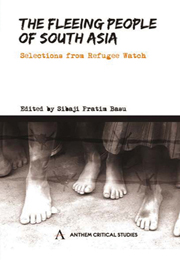Book contents
- Frontmatter
- Contents
- Acronyms and Abbreviations
- Foreword by Ranabir Samaddar
- Preface
- ETHICAL ISSUES
- LAWS
- SOUTH ASIA
- INDIA
- GENDER
- INTERVIEW/CORRESPONDENCE
- Introduction
- Voices from Exile – 1
- Voices from Exile – 2
- Daughter of Isis
- Right of Return
- Letters from a Palestinian Refugee Camp
- REPRESENTATIONS
- Index
Introduction
from INTERVIEW/CORRESPONDENCE
Published online by Cambridge University Press: 05 March 2012
- Frontmatter
- Contents
- Acronyms and Abbreviations
- Foreword by Ranabir Samaddar
- Preface
- ETHICAL ISSUES
- LAWS
- SOUTH ASIA
- INDIA
- GENDER
- INTERVIEW/CORRESPONDENCE
- Introduction
- Voices from Exile – 1
- Voices from Exile – 2
- Daughter of Isis
- Right of Return
- Letters from a Palestinian Refugee Camp
- REPRESENTATIONS
- Index
Summary
Can the marginalized speak? Can ‘we’, who have not lost our homes, truly understand the nuances of the words of pain and agony expressed by the displaced/refugees? It is a difficult task no doubt, especially from the point of the theoretical jigsaw, proposed by postmodern writers. But, disregarding such academic nonsense, people in every age have come forward to the suffering humanity – with sympathy to listen to their voices and with commitment stand by them.
Refugee Watch, the committed friend of the refugees/displaced people of the world, has occasionally sought to present such voices to its readers in the form of interviews or sometimes through ‘personal’ correspondence. The literature of marginalized voices, expressed in the forms of personal diaries, letters and interviews, also known as ‘testimonials’, should not be judged as statements of ‘pure’ truth. Beyond the conventional yardsticks of truth or falsity, they can be seen as catharsis – the process of venting out the emotions of the victim/marginalized. Thus, besides having factual and historical importance, they give us a chance to understand ‘the mind’ of the refugees, or rather ‘minds’.
In this section, we have chosen some of this literature, voiced by the victims and also by a sympathetic observer. Needless to say that the issues and problems raised here are very much relevant and living even today.
- Type
- Chapter
- Information
- The Fleeing People of South AsiaSelections from Refugee Watch, pp. 369 - 370Publisher: Anthem PressPrint publication year: 2009



